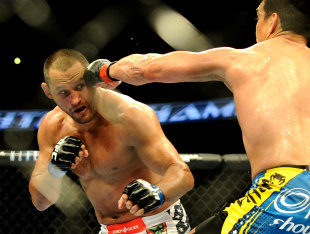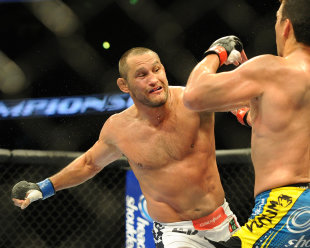http://sports.yahoo.com/news/mma--trt-user-dan-henderson-olympic-style-drug-testing-200826985.htmlLegitimate TRT user Dan Henderson pushing for Olympic-style drug testing in MMAA cloud of suspicion hangs ominously over the heads of athletes in the UFC, their accomplishments viewed by many through the lens of performance-enhancing drug usage.
The use of PEDs is believed to be widespread throughout
professional and high-level amateur sports, but even clean athletes
whose accomplishments are the result of their athletic ability, hard
work and perseverance, are tainted by the mess.
Little is done to stop the usage in combat sports. Postfight drug
testing catches some users, but most experts say it nabs only those who
don't understand how to mask their usage.
In fighting, there is no regularly scheduled regimen in which an
athlete has to report his or her whereabouts to a testing agency in
order to be randomly checked within 24 hours.
So, every time a fighter wins, there is plenty of suspicion that it involved artificial assistance. UFC middleweight contender
Vitor Belfort is the latest to feel the backlash.

Dan Henderson dodges a punch thrown by Lyoto Machida. (USA Today)
Since it was learned he's been on TRT, Belfort has scored several highlight-reel knockouts and
become a legitimate title contender. He's been pressed about the issue so much that he
suggested someone beat up the reporter asking about it, a thoughtless move for which he later apologized.
UFC light heavyweight Dan Henderson, who has had an exemption to use testosterone replacement therapy since 2007, said he believes there is a heavy amount of PED usage in the fight game.
"I think there is a decent amount [of PED usage in MMA]," said Henderson, a member of the 1992 and 1996 U.S. Olympic wrestling teams who will fight Rashad Evans
in the main event of UFC 161 at the MTS Centre in Winnipeg on Saturday.
"Just like at the top level of any sport, there is a decent amount of
it. Guys look for that edge."
Henderson is one of a handful of fighters who have been given a
therapeutic use exemption (TUE) to partake in testosterone replacement
therapy (TRT). Henderson was diagnosed with
hypogonadism, leading to his TUE
There are a number of causes of hypogonadism, or low testosterone, including previous steroid usage. Dr. Jonathan Gelber, an orthopedic surgeon who writes the
Fight Medicine blog estimated that approximately 1 percent of the population between 18 and
40 who have not used anabolic steroids would be hypogonadal.
"It's a rare phenomenon," Gelber said of hypogonadism in people roughly the age of UFC fighters.
Henderson has been granted a TUE
or has at least been permitted to use TRT by athletic commissions in
Nevada, Ohio, Georgia, Tennessee, Missouri, Illinois and California,
according to a document he submitted to the Nevada Athletic Commission when applying for a TUE for the since-canceled UFC 151 event last September.
For his license application for UFC 151, Henderson submitted several
test results of his testosterone levels he had done at Quest
Diagnostics, all of which came in the normal range. The reference range
is 250-1100, meaning anything less than 250 is low and greater than
1,100 is high.
Henderson submitted results taken in West Hills, Calif., while he was
using TRT. He scored 338 on July 23 and 413 on Aug. 3, both in the
normal range.
In 2010, he quit taking TRT for two months and scored 168.
Dr. Karen Herbst, an
endocrinologist at the University of San Diego with a specialization in
testosterone issues in men, reviewed Henderson's blood tests from
2007-2011. She wrote, "It is my conclusion that Dan Henderson
is suffering from hypogonadism with chronically low testosterone levels
and is currently receiving the appropriate course of treatment for his
condition."
Henderson hasn't shied from answering questions about
his testosterone usage, and said he wholeheartedly supports random,
unannounced testing, such as is done in the Olympics.
It's an expensive proposition,
and UFC management has consistently opposed it, but it is the only way
to rid the sport of PED usage.

Dan Henderson winds up to punch Lyoto Machida. (USA Today)
Even then, some will still get away with using PEDs, but random
testing will dramatically reduce the percentage of cheaters who succeed.
"I would welcome random drug testing
for everybody, not just for a few," Henderson said. "Do it for
everybody in the sport, and that would help to clean up the sport quite a
bit. Threatening them with the idea that someone could knock on your
door without any notice and make you pee in a cup would make a big
difference."
That would make things safer for fighters who are facing someone who
is cheating, but Gelber said random testing would also benefit those who
cheat. He said there are plenty of risks to those who abuse
testosterone.
"It doesn't just affect the muscles," he said. "It can affect the
prostate. It can affect the heart. It affects blood cells. These are all
things that can be affected. ... When you inject this stuff or take it
via pills, it doesn't only affect the skeleto-muscular system. You can
get prostate cancer or develop an enlarged prostate.
"You can affect the heart, the liver. The blood gets what we call
more viscous, and that can lead to clots. It's just not a super pill you
can take and get stronger and win fights. It has a lot of risks that go
along with it."
Gelber said athletes use PEDs because of the stakes, and because they have a proven track record of success.
Using steroids isn't going to turn an average couch potato into a contender for a UFC championship overnight, but it can be the difference between winning and losing for the elite athletes already in the sport.
He pointed to the
Lance Armstrong case as an example.
"The guys who were not taking anything, they were world class
cyclists, but they would fall to the back of the pack," Gelber said.
"They were at the top of the world to begin with. So, even within that
small subset of athletes, those elite athletes who do abuse banned
substances can have a significant advantage.
"It's not a golden ticket, especially in the UFC, where one lucky
punch can lead to a knockout, but [using PEDs] has demonstrably been
proven to create an advantage."
Henderson, 42, has never failed a drug test. He's made many
contributions to the sport, and is one of its iconic fighters. He
defeated Mauricio "Shogun" Rua at UFC 139 in a bout many consider the
greatest in the sport's history, and he's won numerous titles in
different weight classes.
But if he can help lead the charge for random unannounced testing, it
may turn out that his greatest accomplishment in the sport came as a
result of what he did outside the cage.
